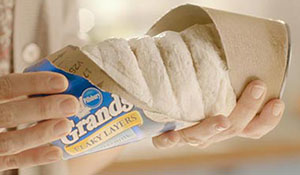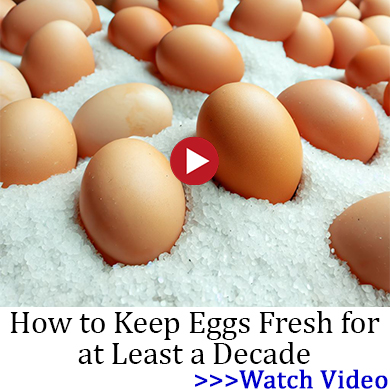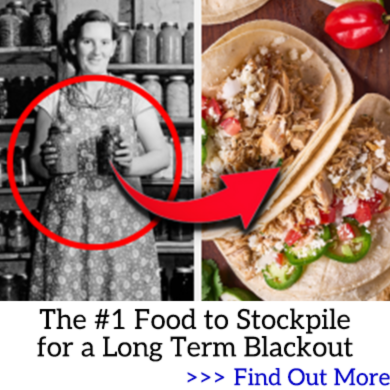After any SHTF scenario or major natural disaster, food is going to be one of the most vital things to have available. You won’t be able to rely on what’s in stores – panic buying or looting will probably have cleaned them all out unless police or the military have secured them first. Either way, the goods in them won’t be available to you. Unless you already have a working smallholding it’s going to take time before you can grow your own, as well. If you want to get through the initial months after the event you’re going to need to have substantial food stocks to hand – ideally enough for at least a year, but even two or three months’ worth will buy you time to become self-sufficient.
The food you store needs to be nutritious enough to keep you healthy, and have enough caloric value that you’ll be able to work hard for long days without feeling fatigued – surviving isn’t an easy task. It also needs to have enough variety not to become monotonous, and stocking up on a few favorites will help keep your morale up in stressful circumstances.
Unfortunately, you can’t just store anything you like. If you don’t have your own generator power will be unreliable, so you can’t depend on anything that needs to be kept frozen or refrigerated. That rules out most modern ready meals. Tinned food is a better bet – much of it can be safely stored at room temperature for years – but some tinned goods will also deteriorate. That’s also an expensive way to build up a reserve, so for most people the realistic option will be to stockpile some staples – mostly carbohydrates – and use foraged or grown items to supplement them.
Many bulk foods, like pasta, beans or dry white rice, can be stored almost indefinitely. Others can’t; over time they will go stale or rancid, and they can also attract pests. Here is an introduction to the main goods that you either CAN’T store or should do so with a lot of caution.
#10 Baked Goods
 Baked goods can’t be stored for more than a few days without freezing, so it’s tempting to stock up on enough flour to let you bake your own for a few years. Unfortunately, this isn’t a great idea. Flour can be stored for a while, but it isn’t viable as a long-term option. Wheat flour will only last around eight months before deteriorating badly. Refined flour does a bit better, but even then it can only really be kept for around two years.
Baked goods can’t be stored for more than a few days without freezing, so it’s tempting to stock up on enough flour to let you bake your own for a few years. Unfortunately, this isn’t a great idea. Flour can be stored for a while, but it isn’t viable as a long-term option. Wheat flour will only last around eight months before deteriorating badly. Refined flour does a bit better, but even then it can only really be kept for around two years.
The major problem with flour is infestation by psocids, or booklice, which are tiny black or brown insects. Once the flour has been opened it will quickly attract these pests, and once they get in they’ll multiply quickly. To deter them always store flour in sealed airtight containers, and make sure it’s absolutely dry. Flour usually comes in paper packages, and psocids are well known for their ability to get through paper. If you want to store a few months’ supply of flour then seal the bags inside plastic ones – if you can vacuum-pack them that’s even better – then store those in a plastic bin with a tight-fitting lid. Keep the area around the store clean and sweep up any spilled flour immediately (don’t mop it) to avoid attracting psocids. Never mix old and new flour.
If the SHTF you can’t rely on having more than two years’ supply of flour, but why not store grain instead? This is protected by its natural husks, so it’s much more resistant to insects. Mice and rats can be a problem, though, so again pack wheat or barley in plastic bags and store them in a bin. Rats can chew through plastic – consider a thoroughly cleaned steel trash can.
Another option is to buy flour and bake it into a hard tack. You will find plenty of recipes for this traditional military and seafaring food. It’s extremely simple to make – just flour, water and a pinch of salt – and if you keep it dry it will last for years.
Related: Turning Flour into Hardtack Biscuits With Over 100 Year Shelf Life
#9 Canned Bread
 There’s a popular recent trend for baking home-canned bread and cakes. These are simple to make; usually, you pour batter into Mason jars, bake them in the oven, then seal the jar and cool it. That creates a partial vacuum inside the jar, which will preserve the contents for a while. Canned baked goods, especially cakes, are often given as Christmas or birthday gifts, and that’s usually not a problem. However, a lot of people also say that they can be stored for up to a year; some claim they can be stored indefinitely.
There’s a popular recent trend for baking home-canned bread and cakes. These are simple to make; usually, you pour batter into Mason jars, bake them in the oven, then seal the jar and cool it. That creates a partial vacuum inside the jar, which will preserve the contents for a while. Canned baked goods, especially cakes, are often given as Christmas or birthday gifts, and that’s usually not a problem. However, a lot of people also say that they can be stored for up to a year; some claim they can be stored indefinitely.
It might sound tempting, but this is a really bad idea. The problem is a bacterium, Clostridium botulinum. This organism grows from tough spores that are found almost everywhere but will only grow in certain conditions. It thrives in moist, nutrient-rich environments with little or no oxygen – and unfortunately the baking and canning process creates an environment that’s just about perfect for it. As the bacteria grow they produce a toxin, commonly known as botox, that can be lethal when it contaminates food.
Related: How to Tell When Your Canned Foods Become Spoiled?
There is no guaranteed way to make Botulinus-free canned bread at home. The spores are heat-resistant enough that baking won’t kill them, and although some scientists have developed bread recipes that are designed to prevent the bacteria from growing it’s just too easy to get it wrong. Canned bread is fine as a gift or treat that will be eaten within a few days, but it should never be stored long-term. It is definitely not safe, and the consequences can be deadly. In a survival situation, botox poisoning is untreatable. Don’t risk it.
#8 Canned Tomatoes
Most canned foods can be stored for a long time – often pretty much indefinitely. Tomatoes are one of the exceptions. The problem is the juice, which over time will attack the can. When you hear people complain about issues storing canned foods, a lot of the time it’s going to be a tomato product. Possible problems include bulged or leaking cans and even split seams.
Even if the can looks fine and there are no visible leaks it could have tiny perforations that mean it’s no longer airtight – and so it’s no longer safe. If you open any can of a tomato product and it’s discolored or has an unusual smell, don’t risk it – throw it out. Few preppers can resist keeping some canned tomatoes because they’re so versatile, but don’t keep more than about six months’ worth and make sure you rotate your stock regularly.
#7 Canned Fat Meat (some)
There are risks storing any kind of meat because it can host so many bacteria and parasites; canned varieties are among the safer ones but there are still limits. Meat contains fat, and fat is made up of acids; the contents can be acidic enough to damage the can. The quality will also go downhill after a while, so even if it’s still safe it won’t be very appetizing.
Canned tuna will also deteriorate – it tends to become mushy after long storage. Other canned foods are usually safe to keep for several years at least; texture and flavor may deteriorate, but they should stay edible. For best results keep cans in a dark, dry place with a constant cool temperature. Avoid uninsulated attics or garages, as these often have dramatic temperature changes. Basements are ideal as long as they don’t have a dampness problem. Damp conditions will eventually corrode cans, and this can let air in long before there are any visible leaks.
Related: Awesome Places Where You Can Hide Your Food When SHTF
#6 Homemade Jerky
Compact dehydrators are becoming popular and a lot of preppers now have them. They’re a great way to make tasty and healthy fruit snacks, and of course, they’re a Godsend to any jerky fans. Commercial jerky is expensive, but you can make your own from cheap cuts of beef and it tastes just as good. Unfortunately, it isn’t as safe to store. Commercially made jerky is processed in industrial dehydrators that let the moisture content be very precisely controlled. Home models aren’t as predictable – even the humidity in your kitchen can affect the moisture content of the finished product. Homemade jerky is pretty safe for normal consumption, but if you store it for months or years there’s a risk from any bacteria that survived the drying process.
If you’re determined to store homemade jerky, vacuum pack it and include a silica gel sachet with each batch to soak up any excess moisture.
#5 Graham Crackers
These seem like a simple, trouble-free item to store, but they’re not – they develop a rancid taste over time. Don’t rely on them staying tasty for more than a year. You can extend that another year or two by repackaging them in vacuum-sealed packages, or in an airtight container with oxygen absorbers.
Long-term, a better idea is to have the ingredients to make your own graham crackers. It isn’t hard and you can find plenty of recipes online.
Many other crackers are also bad choices for long-term storage. Unless you take a lot of care to seal them in an airtight package they tend to go soft and lose their texture. Many also pick up a stale, unpleasant taste. It’s fine to have a few boxes of crackers in your SHTF stash but make sure you rotate through them regularly. Saltines are an example – these won’t stay fresh for more than about six months.
#4 Eggs
Eggs keep a lot better than most people realize; even if you don’t refrigerate them they still last for a week or more, and in the fridge you can keep them for three weeks or so. Few people would seriously consider adding them to a long term food store, though. Then again, there are some who believe it’s possible. Spend a lot of time around other preppers and somebody’s most likely going to tell you that, properly prepared, eggs can be kept good for months, or even years. Usually, two methods are suggested:
- Dipping the eggs in petroleum jelly
- Dunking them briefly in boiling water
 The idea behind both of them is that they will seal the inside of the egg from any bacteria that could get in. This is not the case, and neither of these methods will extend the storage life of an egg. If you want to add eggs to your emergency food stash go for the powdered kind. They’re less flexible, and a bit less appetizing, but unlike fresh eggs they can be stored safely for longer than a couple of weeks.
The idea behind both of them is that they will seal the inside of the egg from any bacteria that could get in. This is not the case, and neither of these methods will extend the storage life of an egg. If you want to add eggs to your emergency food stash go for the powdered kind. They’re less flexible, and a bit less appetizing, but unlike fresh eggs they can be stored safely for longer than a couple of weeks.
Related: How to Make Powdered Eggs
#3 Breakfast Cereals
The packaging on these isn’t sturdy or airtight enough for long term storage. After a year or so they’ll soften and start to taste stale. If you’re looking for a breakfast carb option, consider oatmeal instead. It will last for years and it’s also a lot more nutritious. If you do decide to keep a supply of cereals don’t buy it in huge bulk boxes – once it’s opened the slow deterioration will speed up dramatically. Opt for standard-size packs that you can eat in a week or two.
#2 Butter
Butter will last a lot longer than most dairy products except hard cheeses, but it’s still not a good choice for long term storage. Wrapped or home-canned butter should be completely avoided; commercially canned can be kept for a while, but be sure to rotate it regularly to avoid old cans turning rancid at the back of your shelf.
#1 Nut Oils
A lot of people think these are healthy alternatives to vegetable oil. They definitely produce tasty meals, but they don’t keep well. Avoid nut oils if you can.
Other cooking oils are generally safe for long-term storage, but some care is needed. Don’t buy large containers; once they’ve been opened the oil will begin to oxidize, which isn’t just bad for the flavor – it can produce dangerous chemicals when the affected oil is heated. Don’t try to save money by buying in bulk then decanting to smaller bottles – you’ll also mix air in, and that will just oxidize it even faster. Instead, buy oils in standard bottles. That way it should be used by the time it starts to deteriorate too badly.
Some of the items on this list make planning your food storage awkward – flour is probably the worst because it’s so widely used. You can keep your carbohydrate intake up with other choices, though, with pasta and rice being favorites. If you have the skills and equipment to grind your own flour it’s possible to store large quantities of wheat, and this will stay edible for years (or more likely decades) as long as you protect it well from vermin.
Any food will last longer if it’s properly looked after; equally, they will all deteriorate more quickly if the storage conditions aren’t right. If there’s something you’re not sure about ask local preppers – they might be able to tell you (although some have their own ideas, so always get a couple more opinions before splashing out a few hundred dollars on foods you can’t store. Finally, us airtight outer packaging when you can to deter pests, and keep your food in the right conditions. Consider investing in vacuum-packing gear. Good luck!
You may also like:
 You Will Not Survive an EMP Strike Without This
You Will Not Survive an EMP Strike Without This
Do You Make These Fatal Mistakes In A Crisis? (Video)
The Top 10 Cereal Grains You Need To Have in a Crisis












Your comment about eggs. I coat mine with mineral oil and store them in the carton in the fridge. I flip the carton over once a month to rotate the eggs. The longest I have kept them was 8 months and all was good. No one could tell the difference in taste or texture. If stored right I believe they would last longer.
I’ll read more about it and maybe I’ll try it. I have lots of eggs, but can’t store them unless I turn them into powder which is not that tasty. Thank you for your comment.
Eggs will store, even on the counter, for longer than you realize. Mother Earth News did a study many years ago using dozens of eggs preserved in various ways. But your conclusion remains valid — you cannot extend storage times into years, so it is a no-go for survivalists.
I’ve heard of coating them eggs with mineral oil but had heard they’ll keep for 1 year.
That is consistent with my understanding. There are other alternatives to mineral oil, although I don’t remember what they are. But still not a long-term survival approach, or even as good as canned foods. And no one claims that a one year old egg tastes as good as fresh, or can be cooked in all the same ways. I understand that hard boiled is your best bet.
Before refrigeration,people used waterglass to preserve eggs.
Water Glass, also called sodium silicate solution, is readily available. Google it. Available as a powder or a water solution.
My grandmother 1876-1970 lived on a rural farm in PA. She used water glass in a cool spring house to keep eggs through the winter when chickens stopped laying. Probably only about 6 months. She also packed eggs in the kitchen in a container so they were covered in salt. That was for up to 6 weeks storage.
If you have UNwashed, CLEAN eggs (store bought will not work for this) you can keep them in a bucket of lime water (1oz hydrated lime by weight to 1 quart of water) for 8 months in a place that isn’t climate controlled and up to 2 years in one that is (say a root cellar.) They do need to be in away from sunlight.
I used Crisco to coat eggs. I then placed the eggs back in the carton and the carton into a sealed plastic tote. I stored the tote in the basement on a shelf. 9 months later, the eggs were not just fine, they were good. I served them to family and no one was able to tell that they were eating 9-month-old eggs.
Canned tomatoes often include Bisphenal-A or BPA in the interior lining. “FDA’s current perspective, based on its most recent safety assessment, is that BPA is safe at the current levels occurring in foods. (according to the FDA website) – That would be fine if I trusted the FDA implicitly, but I don’t.
Consider this statement: “First synthesized in 1891, bisphenol A came into use as a synthetic estrogen in the 1930s. Later, chemists discovered that, combined with phosgene (used during World War I as a toxic gas) and other compounds, BPA yielded the clear, polycarbonate plastic of shatter-resistant headlights, eyeglass lenses, DVDs and baby bottles.” (see the article in http://www.scientificamerican.com/article/just-how-harmful-are-bisphenol-a-plastics/).
My opinion, for what it’s worth …. is BPA is more trouble than it’s worth. After the SHTF, additional risks from food additives and can linings won’t be worth it!
How safe are the MRE meals being sold at Military Surplus stores? How reliable/safe are the professionally dehydrated meals sold by vendors like Wise, COSTCO, and many others, etc.?
MRE meals are safe for their expected shelf life, which is only a few years. In general, forget MREs and substitute canned goods, which are less expensive. Similar to canned foods, MREs are neither lightweight nor long term storage. Both are water packed.
Commercially dehydrated foods are inherently safe. Low controlled moisture levels and professional packaging ensure long shelf life. Rice, beans, pasta, and any other dehydrated items you find at your grocery store have longer shelf lives than wet-packed items, as long as you protect them from pests and moisture.
MREs are high fat, low fiber. You will know after eating a few and trying to use the bathroom.
I really enjoyed the video on making pemmican. I am anxious to try my hand at it.
Thank you Claude. 🙂
I am surprised you didn’t mention coconut oil. It takes forever to go rancid.
With tomatoes, can your own in glass jars or sun dry them and vacuum pack them.
Coconut oil will only last about a year. I know since I buy about 300 lbs of it on average each month. The store bought oils have preservatives, colorants (such as beta-carotene, or even food-grade titanium oxides) and anti-foaming agents added so it doesn’t foam up and cause a fire while frying foods. Pure coconut oil, as I buy, has none of those things and won’t last more than 12 months without starting to go rancid.
Interesting about canned bread. I bought a case of it thinking that it would make an ideal food item for storage. I was surprised to see the reason why it was listed as a non-storage item. Oh well, too soon old, too late smart as the Pennsylvania Dutch used to (or maybe still do) say. Next time I’ll eat my brown bread right away. Back to hardtack.
Professionally canned bread does not have the safety issues mentioned in the article. But it doesn’t have a really long shelf life either. Other carbs, such as rice, beans, and pasta, are dried, and thus can have longer shelf lives, if pests and moisture are kept out. And are much less expensive (for the calories) than canned bread.
I want to say that I find this web site the most useful of any I subscribe to. Yes, it isn’t perfect and some articles are weak. Does anyone hit a home run every time at bat? Over all, I find this site contains more useful, practical information. I have learned more at this site and printed out more article from it and any other. Some specialized sites contain more advanced info that is helpful, but for over all, every day practical advice I think this site is tops. Thanks for putting all the effort and work into it. It is appreciated.
In addition, many of the comments that further amplify the original article are helpful. Of course, there are always the naysayers that don’t add anything, but hey, there are Joe Bzfcks (for those of you old enough to remember Lil Abner) all over the place.
Li’l Abner guy is spelled Joe Btfsplk. Google him. Interesting character.
What about oven canning or oven sealing as it is sometimes called? Flours, cereal, crackers, rices, pasta, nuts (not walnuts, too oily), etc. In small batches, pints, quarts and 1/2 gallon jars, these items should last for many years. Put items in open jars on a cookie sheet with sides in case of spills, and heat at 200 degrees for 1 hour. Remove carefully and quickly from oven and seal jar immediately. I have been doing this since I live in a very humid, damp area. Seems to work fine.
Oven sealing is not a safe manor for preserving.
Get a copy of Putting Foods by. It covers all the methods of preservation. Written my home Ec teachers and professionals. It is a book I have learned from and passed copies to my daughters. It goes beyond what is covered in the Ball(Bernadin in Canada) Big books. And covers more than just the Ball/Kerr/Bernadin jar systems.
I also recommend Tattler Reusable canning lids. They are proven safe and economical for homesteading and prepping.
How long is food good in a freezer or a deep freezer?
Basically, it doesn’t ever spoil. But it does get less and less tasty, and loses consistency, eventually to the point of being inedible.
From a survivalist perspective, the main problem is that if the electricity fails, you have to eat or reprocess for safe storage a large amount of food in a very short time. And do so right at the beginning of the crisis, when there are likely to be other high priority issues (anything from a leaking roof to hungry rioters in the streets who may smell your stuff cooking).
I recently experimented with drying bread in the oven at 125 degrees for several hours. I think that one can successfully dry bread and then if kept dry it should last some period of time. My experiment is only a week old, so hard to tell how long it will keep. It is light weight, but the problem is that it probably doesn’t contain much in the way of food value. Tastes better than my hardtack though.
How do you make corn Dodgers?
Mom used to combine cornmeal, salt & baking powder and pour boiling water over it. Let stand til the cornmeal absorbs the water and cools enough that you can press 2-3 TBSPs between your palms. Fry til golden & eat.
PS. I’ve kept eggs in waterglass for a year in the fridge. Great for cooking & adding protein to items like dodgers. Stir in after the mixture cools.
Regarding eggs I don’t see why people put oil on them if one doesn’t wash the eggs to take off the seal when they are laid one can keep them in the ref for up to a year and no not flipping over the cartons either . as for having them out on the counter well I have had for a month and not go bad either . As for flour or any flour pro0ducts I put a bay leaf in them never past the due date as I had a can of something from 2007 opened it heated up and ate . I forgot what it was but even condensed chicken soup lasts past the date and don’t go bad hmm .
I have read the many ways offered [above] to store eggs, but all of them have drawbacks of some kind. However, I will offer an alternative way of keeping eggs, and it can be test-tried, as long as that O-Sh–t time has not arrived. If you find that it works for you, as well it has for us, go for it-, but all in all, powdered eggs offers smallest package [a must when traveling & More, must be Small]….Now you all should know that THE ONE food that lasts for centuries, unchanged, is ‘HONEY’. So this is the ultimate in protective, safe, storage. Using Honey is bulky, and heavy, so it is only practical when not having to move from your location.
First the eggs Must be very clean, as well as your hands and storage vessels [Glass is best, fired clay is also up there with glass, but heavier]. The eggs can be raw [best flavor], but they must ‘Not Be Fertile’, that means hatchable. You can also separate the white from the yoke and store in separate containers. If you are planning to use them mixed in cooking, they must be raw eggs. If you just want eggs as part of a mixed diet-, boil them hard. Either way you choose, place in clean container within inch of top, and seal with Honey.
Small, rather than large containers are best, then the entire amount can soon be used without danger of air being mixed into remaining contents-, as well as Honey not being mixed into broken yokes. Honey is also quite healthful by itself, or used with eggs in baked goods. If large storage vessels are preferred, then the egg white and yoke must be separated for best long-time storage.
When taking small a amount of egg white and or yoke from large containers-, reseal with more Honey.
Of Special Note: “ONLY PURE RAW HONEY MUST BE USED”!! Refined, spun, or filtered Honey is not advised-, even though it to may be used as a sealer, but for much shorter time periods. Honey has been found inside tombs of many Egyptian Kings, and was as Perfect as in hundreds of years past. Many herbs and seasonings [spices] can be be kept for centuries if stored properly. Salt is a needed item and in raw/dry form lasts; ‘Whole’ pepper does well to. Research for info of other chosen dry spice items. Spice Oils, LAST.
When storing the eggs in honey, are the boiled ones peeled or still in the shell? Fill up to the top with honey? any headspace required?
If raw, then it sounds like you are just filling a jar up with raw eggs out of the shell and then topping off with honey before storage. Is the honey up to the top? any airspace needed? stored upright only?
“Corn Dodgers”, How to Make-: Take equal measures of Flour and Ground Cornmeal [‘Coarse’ cornmeal works best], Salt & Pepper [to taste], and mix well in dry bowl. Then cut in Unsalted Beef, or Pork Lard [pork has best flavor] until Small-, Tight-, Palm-sized Balls can be formed.
Then make a ‘Small’ amount of “Dodgers’ and bake in a hot oven [check often for desired results]. You can also press into small 2- 3 inch Flat Cakes, and Fry them till well browned and fairly dry. If your first small batch(s) come out too soft-; mix more flour, cornmeal, S&P, and ‘knead-in’ small amounts at a time until ALL excess lard is dispersed throughout mix [only practice will get this right every time].
You can make many varieties of “Dodgers”: Use Bacon-Bits instead of Lard [Flavored Bacons are available]. Dry Red Pepper bits or powder adds to flavor, as do other spices Sugar/Honey can be used for “Sweet Dodgers”; and to, an egg can be added for flavor and greater ‘stick-together’ tendence of mix.
HOWEVER-, if “Dodgers” are to be kept over an extended time-, use of “Salted/Cured Bacon Bits, or Salted Lard” will make them last much longer without going ‘Rancid’. Also-, store in a DRY Place. Use of a Paper Bag-, or a Cloth-mesh bag helps!! These type of bags will absorb excess Lard from surface of “Dodger”, thus extending their usable, flavorful, life. “Dodgers” Can Not be kept long-term, and fall apart if refrigerated, or frozen. ‘Experience’, is only teacher. Make a small amount to start, and enjoy.
Sam Bass, your Friendly TexasBadMan.
I guess i just don’t understand the concept behind trying to store food “Long term”.
If you don’t have a 25 year supply of flower you shouldn’t (and can’t) store flour for 25 years.
Building your inventory to the point where you are rotating out old stock within it’s expiration date while resupplying with new stock makes more sense.
Lets face facts, if the time comes when there is no flour or tomatoes or eggs or anything else for two years then your attention should be turned to how to grow or produce it. Which means that the effort should be put into having the necessary skills, tools and supplies to make that happen.
AMEN Fred !!!
I guess I wonder about how to store what you grow when there’s nobody producing sugar, vinegar or salt after SHTF.
When I enlisted in the Marine Corps in 1971 we fed on C rations since MRE’s weren’t used until the 1980’s. C rats had to be tested every two years because some rations contained tomato such as the canned spaghetti.
LOVE THIS SITE…SO GLAD I RAN ACROSS IT Lots of good info to check out,thanks to all.
Eggs: If allowed in your area, keep a few chickens. Will lay just about year around in Lighted coop .
I always put a few bay leaves in flour and other dry grain products and have never had a problem with creepy crawlies. I’ve been keeping house for over 55 years and have collected so many hints for prevention and preparation over the years.
I am so happy I found this site!! I have been trying to figure out a way to stock pile food and other things.. So useful!! Thank you!
The best way to keep eggs fresh is to take really good care of your hens !
Have a recipe for dehydrating eggs. Will try it next year when I have my own layers. Here in the SW, layers production cuts way back in the >100 weather. That was new to me. I agree, skills are the best preparation. Must be worth your food to the family or group.
From personal experience, you’re totally wrong about graham crackers. The way to store them long-term is to open the plastic package they’re in before storing them. Make sure they have access to air/oxygen. This after I stored about 50 boxes of graham crackers for about 5 years, and opened one of the packages and ate a couple crackers before storing them. 5 years later, 49 of the 50 boxes were inedible, while the crackers in the package I’d opened 5 years earlier were still fully edible. Try it yourselves and see.
I coated eggs with Crisco and placed them back in the carton. I placed the carton in a sealed plastic tote and stored the tote in the basement (on a shelf). 9 months later, the eggs were just fine.
I hear that powdered milk keeps a long time. Is this just in vac seled bags or tins? here in Oz it is available in supermarkets in plastic liner inside small cardboard box or whaloks like some sort of silver foil yet after a few months/year or two it seems to develop a strong small = is this normal?
Would vacuum-sealing food into mylar bags with those oxygen absorbers last long enough to infect into? Can you do that with liquids?
Pack dry low moisture foods into mylar bags with oxygen absorbers at the bottom. Then seal – U don’t need to have them vacuum sealed. To seal, U can use a hot iron and short piece of 2×4 – or I find best is the hot iron for hair. U can find common methods online.
(there is a formula for how many to use for the volume of container being used) These would be grains, rolled oats, white rice, white sugar, dry beans etc. Properly prepared, these can all be expected to last – on average 25 years. ThechurchofJesusChristofLatterDaySaints.org has excellent information on long term storage as well as online order forms etc.
I used to have chickens that produced more eggs than I could eat and I ate 4 a day for a while. What I did was to crack the eggs into a bowl, stir them up add a dash of vanilla and some salt and pepper and an amount (enough for an omelet) into baggies, carefully wrap them up and freeze them. This won’t work if you have no electricity of course but if you do those eggs will last a long time!
My homemade jerky lasts for months without being in the refer. Not sure what you add to yours but I add only a taste of salt and fresh ground black pepper. Nothing else is actually required and I only add the pepper to keep the varmints away and for my personal taste.
Egg preservation is easy. Wipe them off (do not rinse in water) then coat the egg with mineral oil. They will keep for about a year this way. You do know that chickens don’t lay many eggs during winter.
Lime water UNWASHED eggs and they will last for a year or two fresh. https://www.youtube.com/watch?v=bTlcCvvUjl0
This is the worst article I’ve seen on this site. 9 things I want to comment on: 1. eggs will store in a refrigerator for a minimum of 6 months (and I’d bet a year) with no special anything. Just put the carton in and forget. I buy large quantities on sale and of course rotate them as best I can. I usually eat all of those before stocking up again. 2. I was cleaning out one of my cabinets and found an unopened box of cereal that was over 5 years old according to dates on it. The inner bag was intact and still had air in it. It was puffy like a pillow. IOWs, Airtight. I ate that entire box and it tasted as delicious and crispy like the day it was new. 3. Also that same year I was cleaning out another cabinet and way in the back I found a glass bottle of a name brand Tomato Juice. It had to be close to 40+ years old. It was a very rich looking dark red as compared to modern Tomato Juice I drink from a can. Of course I was extremely leery about drinking this but when I turned the lid and heard the metal cap “pop” I knew the contents were sealed. I drank that juice, but only one glass the first day, just in case. Do you know what? It was the best darn Tomato Juice I’ve ever drank before or since. That was about the year 2019. We got these cabinets in 1976 so this jar had to be from the 1970s or 1980 at the latest when my dad was still here. You do the math. 39 years minimum. 4. Canned meat: I’ve just read articles on this very site, and bought the book they’re pushing, The Lost Super foods…and learned that Canned Corned Beef will last 80 years. Spam will probably last as long also. In WWI the Brit’s gave their troops cans of Bully Beef… (corned beef) 5. Canned Sardines. I’ve eaten these that were several years old and they were perfect as in the day they were new. Can’t give an exact time though. I plan on storing these for decades. Maybe I’ll do batch tests where I eat one can a year to evaluate them. Note: all cans I store I write the date on them in permanent marker. 6. A friend just told me they make glass canning lids to do home canning of Tomatos and I plan on trying that. 7.Real life experience: I’ve stored store bought canned goods in a minimally damp, I’m assuming, location. I lost 80% of my stock over the years. One thing I’ve learned and my mom verified this also, is that generic canned goods only last 2 years max. Name brand canned goods will last 3 and mostly 4 years before rusting/leaking. Of course the dampness/humidity will add to or take away from these numbers. Tomato and fruit go first due to the acid… I should have rotated my stock but didn’t at that time in my life because I was never home to eat anyways. It was cheap insurance at the time. 8. On this site is an article about “lime/slake” of eggs to store them 2 years with no refrigeration. Commenters above mentioned this. 9. lastly, buy a good gravity fed water purification system for shtf! I paid about $70 for mine and it’s good for like 7500 gallons.
Nonfat instant dry milk will last vacuum sealed in mylar (the silver foil lined plastic u referred to )
for a couple decades. I get mine from the Home Storage Centers sponsored by The Church of Jesus Christ of Latter Day Saints. U can google thechurchofjesuschristoflatterdaysaints. org.
The physical stores are open to the public, or order online, and is far more economical and best quality than what u pick up from the store or Walmart / Amazon online – about 70% less costly. We have converted to drinking and we have no problem with it. And we don’t have to pay $4 a gallon for it at the store. Add a small amount of vanilla or almond extract or lately I have been adding a couple tablespoon of some sugar free maple syrup and tastes even better – more like store bought milk.